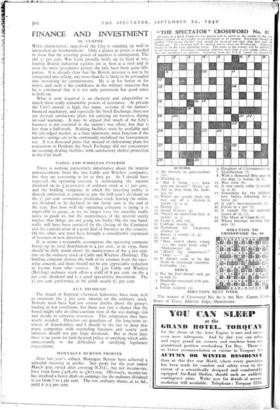FINANCE AND INVESTMENT By CUSTOS
WITII characteristic sang-froid the City is standing up well to intensified air bombardment. Only a glance at prices is needed to show that the resisting power of markets is unimpaired. The old 31 per cent. War Loan proudly holds up its head at tor, leading British industrial equities are as firm as a rock and in even the most speculative groups the falls have been quite
It is already clear that the British investor is not to be stampeded into selling, any more than he is likely to be persuaded into increasing his commitments. He is in for better or for worse, and such is his confidence in the military situation that he is convinced that it is not only patriotism but good sense to hold on.
What is now required is an elasticity and adaptability to match these really remarkable powers of resistance. At present the City's morale is high, but many sections of the nation's financial machinery, and especially the Stock Exchange, have not yet devised satisfactory plans for carrying on business during air-raid warnings. It may be argued that much of the City's business is not essential to the nation's war effort, but that is less than a half-truth. Banking facilities must be available and the gilt-edged market, as a bare minimum, must function if the nation's savings are to be continually mobilised for Government use. It is a thousand pities that instead of elaborating plans for evacuation to Denham the Stock Exchange did not concentrate on securing dealing facilities with satisfactory shelter protection in the City itself.
CABLE AND WIRELESS INTERIM
There is nothing particularly informative about the interim announcements from the two Cable and Wireless companies, but they are reassuring as far as they go. As I should have expected, the operating concern is maintaining the interim dividend on its £30,000,000 of ordinary stock at i t per cent., and the holding company, in which the investing public is directly interested, is content to pay the half-year's dividend on the s1 per cent cumulative preference stock, leaving the ordin- ary dividend to be declared in one lump sum at the end of the year. Just how well the operating company is doing it is impossible to gauge, as we no longer have the monthly traffic index to guide us, but the maintenance of the interim surely implies that things are not going too badly. On the one hand, traffic will have been curtailed by the closing of the Continent and the centralisation of a good deal of business in this country. On the other, war must have brought a considerable expansion of business in new directions.
If, as seems a reasonable: assumption, the operating company brings up its total distribution to 4 per cent., as in 1939, there should be little doubt about the maintenance of the 4 per cent. rate on the ordinary stock of Cable and Wireless (Holding). The holding company derives the bulk of its revenue from the oper- ating concern, and there should not be any appreciable reduction in income from other sources. At £50 Cable and Wireless (Holding) ordinary stock offers a yield of 8 per cent. on the 4 per cent. dividend and is a good speculative investment. The 5i per cent. preference, at 86, yields nearly 61 per cent.
I.C.I. DIVIDEND
The board of Imperial Chemical Industries have done well to maintain the 3 per cent. interim on the ordinary stock. Nobody need have had any serious doubts about the group's trading in war conditions, but there was just a chance that the board might take an ultra-cautious view of the war-damage risk and decide to conserve resources. This temptation they have wisely avoided. Directors are guardians of the long-term in- terests of shareholders, and I should be the last to deny that many companies with expanding business and scanty cash balances should not pay large dividends. But in these days there is no room for faint-hearted policy or anything which adds unnecessarily to the difficulties of satisfying legitimate expectations.
MONTAGUE BURTON PROFITS
After last year's setback Montague Burton have achieved a splendid recovery in profits. Net profit for the year ended March 31st, struck after covering N.D.C., but not income-tax, have risen from £458,261 to £677,099. Obviously, income-tax has involved a heavy draft on earnings, for the ordinary dividend is cut from 7 to 5 per cent. The los. ordinary shares, at is. 6d., yield 6 2-3 per cent.


























 Previous page
Previous page